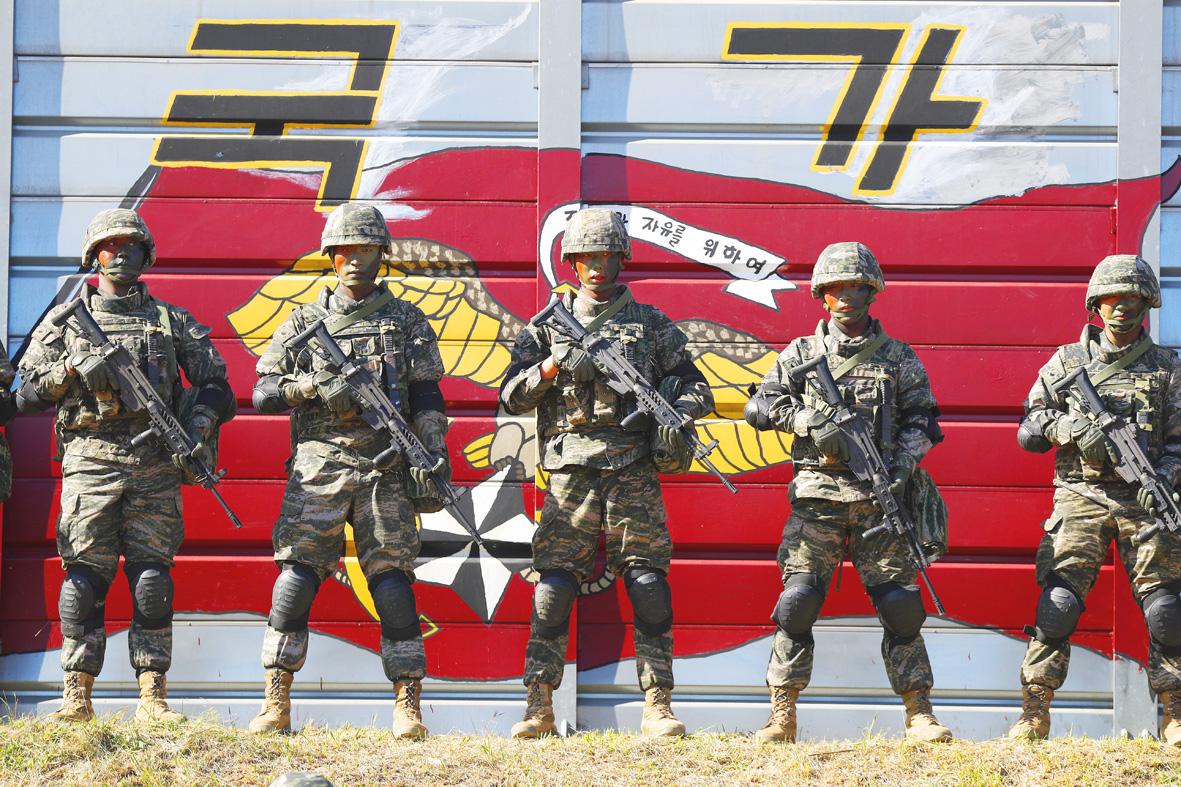The US and South Korea would begin their annual joint military exercises this week, the South Korean Joint Chiefs of Staff said yesterday.
However, a spreading COVID-19 outbreak has apparently forced the allies to scale back an already low-key training program mainly involving computer-simulated war scenarios.
The drills from tomorrow to Aug. 28 could still irk North Korea, which portrays the allies’ training as invasion rehearsals and has threatened to abandon stalled nuclear talks if Washington persists with what it perceives as “hostile policies” toward Pyongyang.

Photo: EPA-EFE
The exercises also come at a delicate time after US President Donald Trump openly complained about the costs of maintaining 28,500 US troops stationed in South Korea to protect against North Korean threats.
The allies have so far failed to sign a new cost-sharing agreement after the last one expired at the end of last year.
The drills involve so-called combined command post training, which is focused on computerized simulations aimed at preparing the two militaries for various battle scenarios, such as a surprise North Korean attack.
The South’s joint chiefs of staff did not specify how many troops would participate.
However, it is clear the size would be smaller than the summer drills of previous years, which often involved tens of thousands of troops on both sides, and combined computer simulations with field training.
This time, the pandemic has limited the number of US troops who could be brought in from abroad.
The US and South Korean militaries had canceled their springtime drills following a COVID-19 outbreak in the southern city of Daegu and nearby towns that had stabilized by April.
However, South Korea is now dealing with a virus resurgence in the densely populated Seoul metropolitan region, home to half of the country’s 51 million people.
It forced US Forces Korea to designate the capital and surrounding areas off-limits to personnel who do not live there.
The 279 new cases South Korea reported yesterday are the highest daily jump since early March.
There have been about 150 COVID-19 infections among US troops stationed in South Korea since February, which prompted Gyeonggi Province near Seoul to last month openly call for the cancelation of the drills.
Gyeonggi includes the city of Pyeongtaek, the site of US military headquarters.
The allies have downsized much of their combined training activity after Trump unilaterally suspended large-scale field training with South Korea after his first summit with North Korean leader Kim Jong-un in June 2018.
Trump then seemed to adopt North Korea’s traditional view of such drills, criticizing them as a “provocative” drain of money.

MORE VISITORS: The Tourism Administration said that it is seeing positive prospects in its efforts to expand the tourism market in North America and Europe Taiwan has been ranked as the cheapest place in the world to travel to this year, based on a list recommended by NerdWallet. The San Francisco-based personal finance company said that Taiwan topped the list of 16 nations it chose for budget travelers because US tourists do not need visas and travelers can easily have a good meal for less than US$10. A bus ride in Taipei costs just under US$0.50, while subway rides start at US$0.60, the firm said, adding that public transportation in Taiwan is easy to navigate. The firm also called Taiwan a “food lover’s paradise,” citing inexpensive breakfast stalls

TRADE: A mandatory declaration of origin for manufactured goods bound for the US is to take effect on May 7 to block China from exploiting Taiwan’s trade channels All products manufactured in Taiwan and exported to the US must include a signed declaration of origin starting on May 7, the Bureau of Foreign Trade announced yesterday. US President Donald Trump on April 2 imposed a 32 percent tariff on imports from Taiwan, but one week later announced a 90-day pause on its implementation. However, a universal 10 percent tariff was immediately applied to most imports from around the world. On April 12, the Trump administration further exempted computers, smartphones and semiconductors from the new tariffs. In response, President William Lai’s (賴清德) administration has introduced a series of countermeasures to support affected

CROSS-STRAIT: The vast majority of Taiwanese support maintaining the ‘status quo,’ while concern is rising about Beijing’s influence operations More than eight out of 10 Taiwanese reject Beijing’s “one country, two systems” framework for cross-strait relations, according to a survey released by the Mainland Affairs Council (MAC) on Thursday. The MAC’s latest quarterly survey found that 84.4 percent of respondents opposed Beijing’s “one country, two systems” formula for handling cross-strait relations — a figure consistent with past polling. Over the past three years, opposition to the framework has remained high, ranging from a low of 83.6 percent in April 2023 to a peak of 89.6 percent in April last year. In the most recent poll, 82.5 percent also rejected China’s

PLUGGING HOLES: The amendments would bring the legislation in line with systems found in other countries such as Japan and the US, Legislator Chen Kuan-ting said Democratic Progressive Party (DPP) Legislator Chen Kuan-ting (陳冠廷) has proposed amending national security legislation amid a spate of espionage cases. Potential gaps in security vetting procedures for personnel with access to sensitive information prompted him to propose the amendments, which would introduce changes to Article 14 of the Classified National Security Information Protection Act (國家機密保護法), Chen said yesterday. The proposal, which aims to enhance interagency vetting procedures and reduce the risk of classified information leaks, would establish a comprehensive security clearance system in Taiwan, he said. The amendment would require character and loyalty checks for civil servants and intelligence personnel prior to